- Home
- Don DeLillo
The Angel Esmeralda Page 5
The Angel Esmeralda Read online
Page 5
Ten strides beyond the bridge the runner saw a woman coming toward him at an angle. She tilted her head in the hopeful way of a tourist who wishes to ask directions. He stopped but not completely, turning gradually so that they continued to face each other while he moved slowly backward on the path, legs still going in a runner’s pump.
She said pleasantly, “Did you see what happened?”
“No. Just the car really. About two seconds.”
“I saw the man.”
“What happened?”
“I was leaving with my friend who lives just across the street here. We heard the car when it came over the curb. More or less bang on the grass. The father gets out and takes the little boy. No one had time to react. They get in the car and they’re gone. I just said, ‘Evelyn.’ She went right off to telephone.”
He was running in place now and she moved closer, a middle-aged woman with an inadvertent smile.
“I recognized you from the elevator,” she said.
“How do you know it was his father?”
“It’s all around us, isn’t it? They have babies before they’re ready. They don’t know what they’re getting into. It’s one problem after another. Then they split up or the father gets in trouble with the police. Don’t we see it all the time? He’s unemployed, he uses drugs. One day he decides he’s entitled to see more of his child. He wants to share custody. He broods for days. Then he comes around and they argue and he breaks up the furniture. The mother gets a court order. He has to stay away from the child.”
They looked toward the slope, where the woman stood gesturing on the blanket. Another woman held some of her things, a sweater, a large cloth bag. A dog went bounding after seagulls down near the path and they lifted and settled again nearby.
“Look how heavy she is. We see more and more of this. Young women. They can’t help it. It’s a condition they’re disposed to. How long are you in the building?”
“Four months.”
“There are cases they walk in and start shooting. Common-law husbands. You can’t separate a parent and expect everything works out. It’s hard enough raising a child if you have the resources.”
“But you can’t be sure, can you?”
“I saw them both and I saw the child.”
“Did she say anything?”
“She didn’t have a chance. He grabbed the boy and got back in the car. I think she was totally frozen.”
“Was anyone else in the car?”
“No. He dropped the boy on the seat and they were gone. I saw the whole thing. He wanted to share custody and the mother refused.”
She was insistent, wincing in the light, and the runner remembered seeing her once in the laundry room, folding clothes with the same dazzled look.
“All right, we’re looking at a woman in a terrible stricken state,” he said. “But I don’t see a common-law husband, I don’t see a separation, and I don’t see a court order.”
“How old are you?” she said.
“Twenty-three.”
“Then you don’t know.”
He was surprised by the sharpness in her voice. He ran in place, unprepared and dripping, feeling heat rise from his chest. A police car swung up over the curbstone and everyone at the blanket turned and looked. The woman came near collapse when the policeman got out of the car. He moved in a practiced amble toward the group. She seemed to want to drop, to sink into the blanket and disappear. A sound came out of her, a desolation, and everyone moved a little closer, hands extended.
The runner used the moment to break off the dialogue. He went back to his laps, trying to recover the rhyme of stride and respiration. A work train passed beyond the trees on the other side of the pond, grave horn braying. He made the wide turn at the south end, feeling uneasy. He saw the small girl trail her father along a narrow path that led to an exit. He saw a second police car on the grass far to his left. The group was breaking up. He crossed the bridge, trying to spot the woman he’d been talking to. Ducks sailed in wobbly lines to the scattered bread.
Two more laps and he could call it quits.
He ran faster, still working at a cadence. The first police car left with the woman. He saw that the far end was empty now, sliding into deep shade. He made the turn, knowing he’d been wrong to cut the conversation so abruptly, even if she’d spoken sharply to him. A traffic cone jutted from the shallows. The runner approached the bridge.
Several strides into the last lap he veered onto the slope, gradually slowing to a walk. A policeman leaned on the door of the cruiser, talking to the last witness, a man who stood with his back to the runner. Cars hurried past, some with headlights shining. The policeman looked up from his notebook when the runner drew near.
“Sorry to interrupt, officer. I just wonder what the woman said. Was it her husband, someone she knew, who snatched the child?”
“What did you see?”
“Just the car. Blue with one discolored fender. Four-door. I didn’t see the plates or notice the make. The slightest glimpse of the man, moving kind of crouched.”
The policeman went back to his notes.
“It was a stranger,” he said. “That’s all she could tell us.”
The other man, the witness, had half turned, and now the three of them stood in a loose circle, uncomfortably caught, eyes not meeting. The runner felt he’d entered a rivalry of delicate dimensions. He nodded at no one in particular and went back to the path. He started running again, going in a kind of skelter, elbows beating. A cluster of gulls sat motionless on the water.
The runner approached the end of the run. He stopped and leaned over deeply, hands on hips. After a moment he started walking along the path. The police car was gone and tire marks cut across the grass, three sets of curves that left ridges of thick dirt. He went out to the street and walked across the overpass toward a row of lighted shops. He never should have challenged her, no matter how neat and unyielding her version was. She’d only wanted to protect them both. What would you rather believe, a father who comes to take his own child or someone lurching out of nowhere, out of dreaming space? He looked for her on the benches outside their building, where people often sat on warm evenings. She’d tried to extend the event in time, make it recognizable. Would you rather believe in a random shape, a man outside imagining? He saw her sitting under a dogwood tree in an area to the right of the entrance.
“I looked for you back there,” he said.
“I can’t get it out of my mind.”
“I talked to a policeman.”
“Because actually seeing it, I couldn’t really grasp. It was so far-fetched. Seeing the child in that man’s grip. I think it was more violent than guns. That poor woman watching it happen. How could she ever expect? I felt so weak and strange. I saw you coming along and I said I have to talk to someone. I know I just ranted.”
“You were in complete control.”
“I’ve been sitting here thinking there’s no question about the elements. The car, the man, the mother, the child. Those are the parts. But how do the parts fit together? Because now that I’ve had some time to think, there’s no explanation. A hole opened up in the air. That’s how much sense it makes. There isn’t a chance in a thousand I’ll sleep tonight. It was all too awful, too enormous.”
“She identified the man. It was definitely the father. She gave the police all the details. You had it just about totally right.”
She looked at him carefully. He had a sudden sense of himself, rank and panting, cartoonish in orange shorts and a torn and faded top, and he felt a separation from the scene, as if he were watching from a place of concealment. She wore that odd pained smile. He backed up slightly, then leaned to shake her hand. This was how they said good night.
He went into the white lobby. The echo of the run hummed in his body. He stood waiting in a haze of weariness and thirst. The elevator arrived and the door slid open. He rode up alone through the heart of the building.
THE IVORY ACROBAT
The cardplayers stood outside the café, some of them inspecting a chunk of fallen masonry on the sidewalk, others looking toward the roof. Here and there a jutting face, a body slowly turning, searching. She wore what she’d been wearing when it started, jeans and shirt and light sweater, and it was night and winter, and funny-looking moccasins she only wore indoors. The horns grew louder in a kind of cry, an animal awe. The panic god is Greek after all. She thought about it again and wasn’t sure the lights had been out at all. Women stood with arms folded in the cold. She walked along the middle of the street, listening to the voices, translating phrases to herself. It was the same for everyone. They said the same things and searched for faces. The streets were narrow here and people sat in parked cars, smoking. Here and there a child running, hand-shuffling through the crowd, excited children out near midnight. She thought there might be a glow in the sky and climbed a broad stepped street that had a vantage toward the gulf. She seemed to recall reading there’s sometimes a light in the sky just before it happens or just after. This came under the heading of unexplained.
After a while they started going back inside. Kyle walked for three hours. She watched the cars push into major avenues that led to the mountains and the coast. Traffic lights were dark in certain areas. The long lines of cars, knotted and bent, made scant gains forward. Paralysis. She thought the scene resembled some landscape in the dreaming part of us, what the city teaches us to fear. They were pressing on the horns. The noise spread along the streets and reached a final mass denial, a desolation. It subsided after a time, then began to build again. She saw people sleeping on benches and families collected in cars parked on sidewalks and median strips. She recalled all the things she’d ever heard about an earthquake.
In her district the streets were almost empty now. She went into her building and took the stairs to five. The lights were on in her flat, and there were broken pieces of terracotta (she only now remembered) scattered on the floor by the bookcase. Long cracks branched along the west wall. She changed into walking shoes, put on a padded ski jacket and turned off the lights except for a lamp by the door. Then she placed herself on the sofa between a sheet and blanket, her head resting on an airline pillow. She closed her eyes and folded up, elbows at her midsection, hands pressed together between her knees. She tried to will herself to sleep but realized she was listening intently, listening to the room. She lay in a kind of timeless drift, a mindwork spiral, carried on half-formed thoughts. She passed into a false sleep and then was listening again. She opened her eyes. The clock read four-forty. She heard something that sounded like sand spilling, a trickle of gritty dust between the walls of abutting structures. The room began to move in a creaking sigh. Louder, powerfully. She was out of bed and on her way to the door, moving slightly crouched. She opened the door and stood under the lintel until the shaking stopped. She took the stairway down. No neighbors popping out of doors this time, bending arms into coats. The streets remained nearly empty and she guessed people didn’t want to bother doing it again. She wandered well past daybreak. A few campfires burned in the parks. The horn-blowing was sporadic now. She walked around her building a number of times, finally sitting on a bench near the newspaper kiosk. She watched people enter the street to begin the day and she looked for something in their faces that might tell her what kind of night they’d spent. She was afraid everything would appear to be normal. She hated to think that people might easily resume the knockabout routine of frazzled Athens. She didn’t want to be alone in her perception that something had basically changed. The world was narrowed down to inside and outside.
She had lunch with Edmund, a colleague at the little school where she taught music to children of the international community, grades three to six. She was eager to hear how he’d reacted to the situation but first talked him into eating outdoors at a table set against the facade of a busy snack bar.
“We could still be killed,” Edmund said, “by falling balconies. Or freeze in our chairs.”
“How did you feel?”
“I thought my heart was going to jump right through my chest.”
“Good. Me too.”
“I fled.”
“Of course.”
“On my way down the stairs I had the oddest conversation with the man who lives across the hall. I mean we’d hardly said a word to each other before this. There were two dozen people barreling down the stairs. Suddenly he wanted to talk. He asked me where I work. Introduced me to his wife, who was pretty goddamn uninterested at that point in the details of my employment. He asked me how I like living in Greece.”
Skies were low and gray. People called to each other on the street, chanted from passing cars. Eksi komma eksi. They were referring to the first one, the bigger one. Six point six. Kyle had been hearing the number all morning, spoken with reverence, anxiety, grim pride, an echo along the brooding streets, a form of fatalistic greeting.
“Then what?” she said.
“The second one. I woke up moments before.”
“You heard something.”
“Like a child tossing a handful of sand against the window.”
“Very good,” she said.
“Then it hit.”
“It hit.”
“Bang. I leaped out of bed like a madman.”
“Did the lights go out?”
“No.”
“What about the first time?”
“I’m not sure actually.”
“Good. Neither am I. Was there a glow in the sky at any point?”
“Not that I noticed.”
“We could be dealing with a myth here.”
“The newspapers said a power station may have failed, causing a flash. There’s confusion on this point.”
“But we experienced similar things.”
“It would appear,” he said.
“Good. I’m glad.”
She thought of him as the English Boy although he was thirty-six, divorced, apparently arthritic and not even English. But he felt the English rapture over Greek light, where all Kyle saw was chemical smoke lapping at the ruins. And he had the prim outdated face of a schoolboy in a formal portrait, wire-haired and pensive.
“Where was the epicenter?” she said.
“About forty miles west of here.”
“The dead?”
“Thirteen and counting.”
“What will we do?”
“About what?” he said.
“Everything. All the aftershocks.”
“We’ve had two hundred already. It’s expected to last many weeks. Read the papers. Months perhaps.”
“Look, Edmund. I don’t want to be alone tonight. Okay?”
She lived inside a pause. She was always pausing, alone in her flat, to listen. Her hearing developed a cleanness, a discriminating rigor. She sat at the small table where she ate her meals, listening. The room had a dozen sounds, mainly disturbances of tone, pressures releasing in the walls, and she followed them and waited. There was a second and safer level she reserved for street noises, the elevator rising. All the danger was inside.
A rustle. A soft sway. She crouched in the open doorway like an atomic child.
The tremors entered her bloodstream. She listened and waited. She couldn’t sleep at night and caught odd moments in daytime, dozing in an
unused room at the school. She dreaded going home. She watched the food in her plate and sometimes stood, carefully listening, ready to go, to get outside. There must be something funny in this somewhere, a person standing motionless over her food, leaning ever so slightly toward the door, fingertips at the table edge.
Is it true that before a major quake the dogs and cats run away? She thought she’d read somewhere that people in California habitually check the personal columns in newspapers to see if the number of lost dogs has increased noticeably. Or are we dealing with a myth here?
The wind made the shutters swing and bang. She listened to the edges of the room, the interfaces. She heard everything. She put a tote bag near the door for hasty exits—money, books, passport, letters from home. She heard the sound of the knife sharpener’s bell.
She didn’t read the papers but gathered that the tremors numbered in the eight hundreds by latest count and the dead added up to twenty now, with hotel rubble and tent cities near the epicenter and people living in open areas in parts of Athens, their buildings judged unsafe.
The cardplayers wore their coats indoors. She walked past the cut-back mulberry trees and through the street market and looked at the woman selling eggs and wondered what she could say to her that might make them both feel better, in her fairly decent Greek, shopping for bargains. A man held the elevator door but she waved him off politely and took the stairs. She walked into her flat, listening. The terrace canopies humped out in the wind, snapping hard. She wanted her life to be episodic again, unpremeditated. A foreigner anonymous—soft-footed, self-informed, content to occupy herself in random observation. She wanted to talk unimportantly to grandmothers and children in the streets of her working-class district.

 Great Jones Street (Contemporary American Fiction)
Great Jones Street (Contemporary American Fiction) Americana
Americana Running Dog
Running Dog Libra
Libra End Zone
End Zone Ratner's Star
Ratner's Star Underworld
Underworld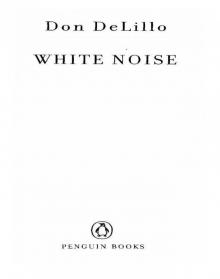 White Noise
White Noise Players
Players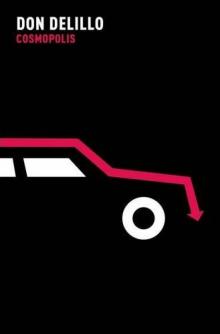 Cosmopolis
Cosmopolis The Silence
The Silence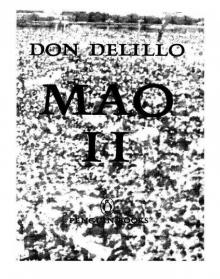 Mao II
Mao II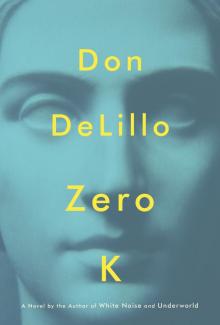 Zero K
Zero K Great Jones Street
Great Jones Street The Angel Esmeralda
The Angel Esmeralda The Names
The Names The Body Artist
The Body Artist Point Omega
Point Omega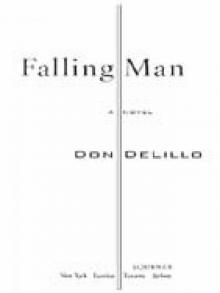 Falling Man
Falling Man